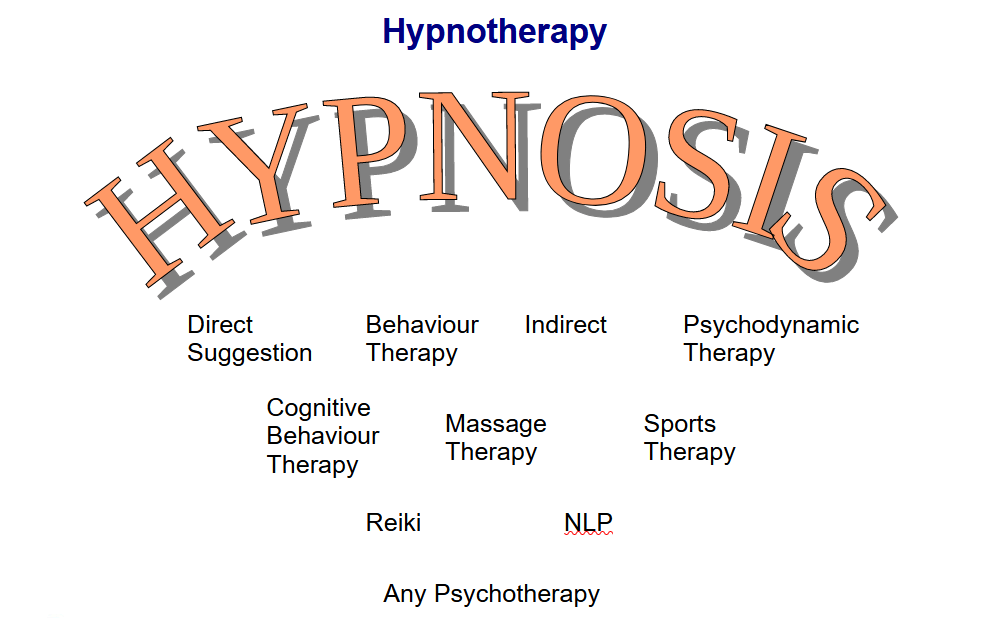
- There are a number of different approaches that are recognised in the practice of hypnotherapy and hypnotherapy training. Each of these have a role to play in a modern hypnotherapy practice and part of any hypnotherapy course.
- Understanding all of these approaches and their associated techniques will arm the hypnotherapist with the knowledge and skills needed to help many different types of clients with different treatment needs
- Attempting to treat all clients with just a single approach is limiting for both the therapist and the client.
- A client may require a number of these approaches being integrated into their treatment strategy.
- It is recommended that any serious student of hypnotherapy aim to learn and become proficient in all of these different approaches.
- A professional hypnotherapist should ideally become competent and skilled in each of these approaches.
- Many non-professional, as well as professional hypnotherapy training courses may teach only a single approach, or a few of these approaches.
- Poorly trained hypnotherapists, unable to integrate these different approaches, are unable to offer clients the best quality care and treatment.
Direct Suggestion Hypnotherapy
-
This approach has been derived from the more traditional techniques used in the practice of hypnosis.
-
Many hypnotherapy training courses only teach this approach.
Psychodynamic or Analytical Hypnotherapy
-
This approach integrates the use of hypnosis into the traditional psychoanalytical approaches to therapeutic intervention (regression, problem based therapy, etc.).
-
Many hypnotherapy training courses only teach this approach, or rely heavily on this approach and old fashioned problem based therapy, which has no evidence base to support its use.
Indirect Hypnotherapy
-
This approach is also referred to as Ericksonian hypnosis or conversational hypnosis. Neuro Linguistic Programming (NLP) hypnosis approaches are based on the work of Dr Milton Erickson, NLP developed a language and structure around Erickson's work.
-
Some hypnotherapy training courses only teach this approach.
Cognitve Behavioural Hypnotherapy
-
This has become a popular approach to hypnotherapy, as it integrates the use of hypnosis into Cognitive Behavioural Therapy (CBT).
-
Some hypnotherapy training courses only teach this approach.
-
The ICCHP teaches a more powerful integrative CBH approach, which incorporates Rational Emotive Behavioural Therapy (REBT). This is much more empowering and attractive for clients, than CBT.
Behavioural Hypnotherapy
-
This is the integration of hypnosis with traditional behaviour therapy techniques, like systematic desensitisation, aversion therapy, etc.
-
Many hypnotherapy training courses only teach this approach.
Hypno Psychotherapy
-
Professional hypnotherapy training and practice should always include the therapeutic approaches associated with modern psychotherapy. A professional hypnotherapist is a psychotherapist, who integrates hypnotic processes with psychotherapeutic approaches. Well respected psychotherapeutic interventions like Eye Movement Desensitisation and Reprogramming (EMDR), Ego State Therapy, etc. should form part of the hypnotherapist’s training.
-
Some hypnotherapy training courses teach this approach.
Integrative Hypnotherapy
-
This is the integration of all the different hypnotherapy approaches, as well as other physical and psychological health treatments.
-
Very few hypnotherapy training courses include this approach.
Evidence Based Hypnotherapy
-
This is inclusion of evidenced-based therapeutic treatments, backed up by scientific and clinical research and expertise. It also includes the knowledge and understanding of what evidence based practice methodology and models are applied to the practice of hypnotherapy.
-
Very few hypnotherapy training courses include this approach.
Mind Body Health Practice
-
There are also practices where hypnosis is being integrated with other complementary health approaches, such as energy healing therapies like Emotional Freedom Therapy (EFT), Reiki, Tai Chi, Chi Gong, Yoga, Massage, Mindfulness and other meditative practices, mind management and coaching, etc.
-
Only the ICCHP hypnotherapy training course includes this approach.
